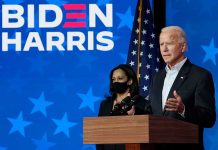
Federal judge halts FTC’s ban on noncompete agreements, potentially reshaping the American labor landscape.
At a Glance
- Judge Ada Brown blocks FTC’s rule banning most noncompete agreements.
- Ruling deems FTC exceeded its authority, calling the rule “arbitrary and capricious.”
- U.S. Chamber of Commerce and other plaintiffs succeed in legal challenge.
- FTC considers appeal as similar lawsuits yield different outcomes in other states.
- Debate continues over noncompete agreements’ impact on business and workers.
Federal Judge Strikes Down FTC’s Noncompete Ban
In a significant blow to the Federal Trade Commission’s (FTC) efforts to reshape labor practices, U.S. District Judge Ada Brown has blocked the agency’s rule that would have banned most noncompete agreements. The ruling, issued in Texas, grants a motion for summary judgment filed by the U.S. Chamber of Commerce and other plaintiffs, effectively halting the FTC’s plans just weeks before the rule was set to take effect on September 4.
Judge Brown, appointed by former President Donald Trump, ruled that the FTC had overstepped its authority in attempting to implement such a sweeping ban. The decision characterized the FTC’s rule as “arbitrary and capricious,” dealing a significant setback to the agency’s regulatory agenda. This outcome was anticipated by many observers after Brown issued a preliminary injunction against the rule in July.
Implications for Businesses and Workers
The blocked rule would have prohibited employers from imposing noncompete clauses on their workers, a practice that restricts employees from joining rival companies or starting competing businesses after leaving their jobs. Proponents of noncompete agreements, including many businesses, argue that these contracts are essential for protecting trade secrets, business relationships, and investments in employee training.
On the other hand, critics of noncompete clauses, including the FTC, contend that such agreements stifle competition, suppress wages, and limit worker mobility. The agency’s now-blocked rule aimed to boost competition in the labor market and provide greater opportunities for workers to advance their careers.
Legal Landscape and Potential Supreme Court Involvement
While the Texas ruling represents a victory for business interests, the legal battle over noncompete agreements is far from settled. Similar lawsuits filed in Florida and Pennsylvania have yielded different outcomes, creating a patchwork of conflicting decisions across the country. This divergence in rulings suggests that the issue could potentially make its way to the U.S. Supreme Court for a definitive resolution.
Despite this setback, the FTC retains the ability to address noncompete agreements through case-by-case enforcement actions. The agency is currently considering an appeal of Judge Brown’s decision, signaling its commitment to pursuing restrictions on these controversial employment practices.
Ongoing Debate and Future Outlook
The ruling has reignited the debate over the role of noncompete agreements in the American economy. Supporters of these clauses maintain that they are crucial for fostering innovation and protecting legitimate business interests. Critics, however, argue that they unfairly restrict workers’ rights and hinder economic dynamism.
As the legal battles continue and the FTC weighs its options, the future of noncompete agreements remains uncertain. This latest development underscores the complex interplay between federal regulation, business interests, and worker rights in shaping the American labor market. For now, employers can continue to use noncompete agreements, but they should remain vigilant as this contentious issue evolves in the courts and regulatory arena.
Sources:
- Federal judge rejects FTC rule banning noncompete agreements
- US judge strikes down Biden administration ban on worker ‘noncompete’ agreements
- FTC’s bid to ban noncompete agreements rejected by federal judge in Texas
- Texas Federal Judge Partially Blocks FTC Ban on Non-Competes
- Federal judge blocks noncompete ban, and FTC considers appeal
- FTC Non-Compete Ban Enjoined Nationwide (US)
- Federal judge blocks FTC noncompete ban
- Judge Blocks F.T.C.’s Noncompete Rule










